Marine Life & Conservation
Things that sting… and how to avoid them!
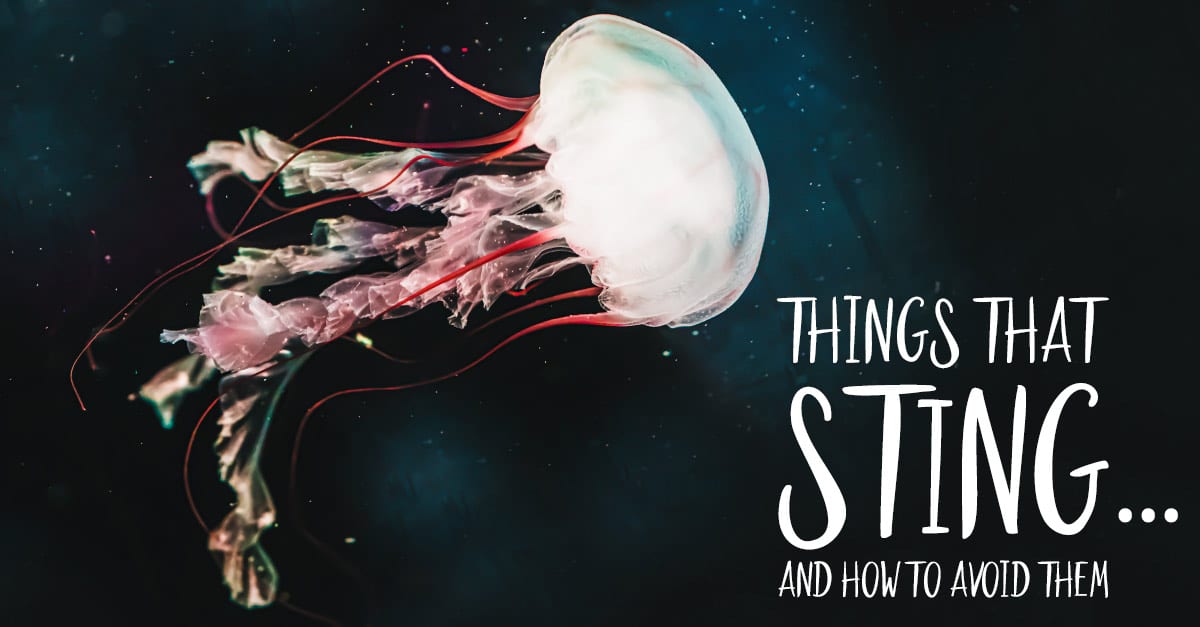
By Gemma Smith
Here be Dragons warned medieval maps, as land gave way to uncharted oceans and their mysterious inhabitants. Well, as it turns out there are dragons in the seas, but they are small and loveable (Phyllopteryx taeniolatus). No threat at all! There are however creatures who can give divers, snorkelers, swimmers and surfers painful and, at times, fatal stings. Here are some of them to look out for… but remember, these animals are only defending themselves or trying to catch their dinner!
Stingray
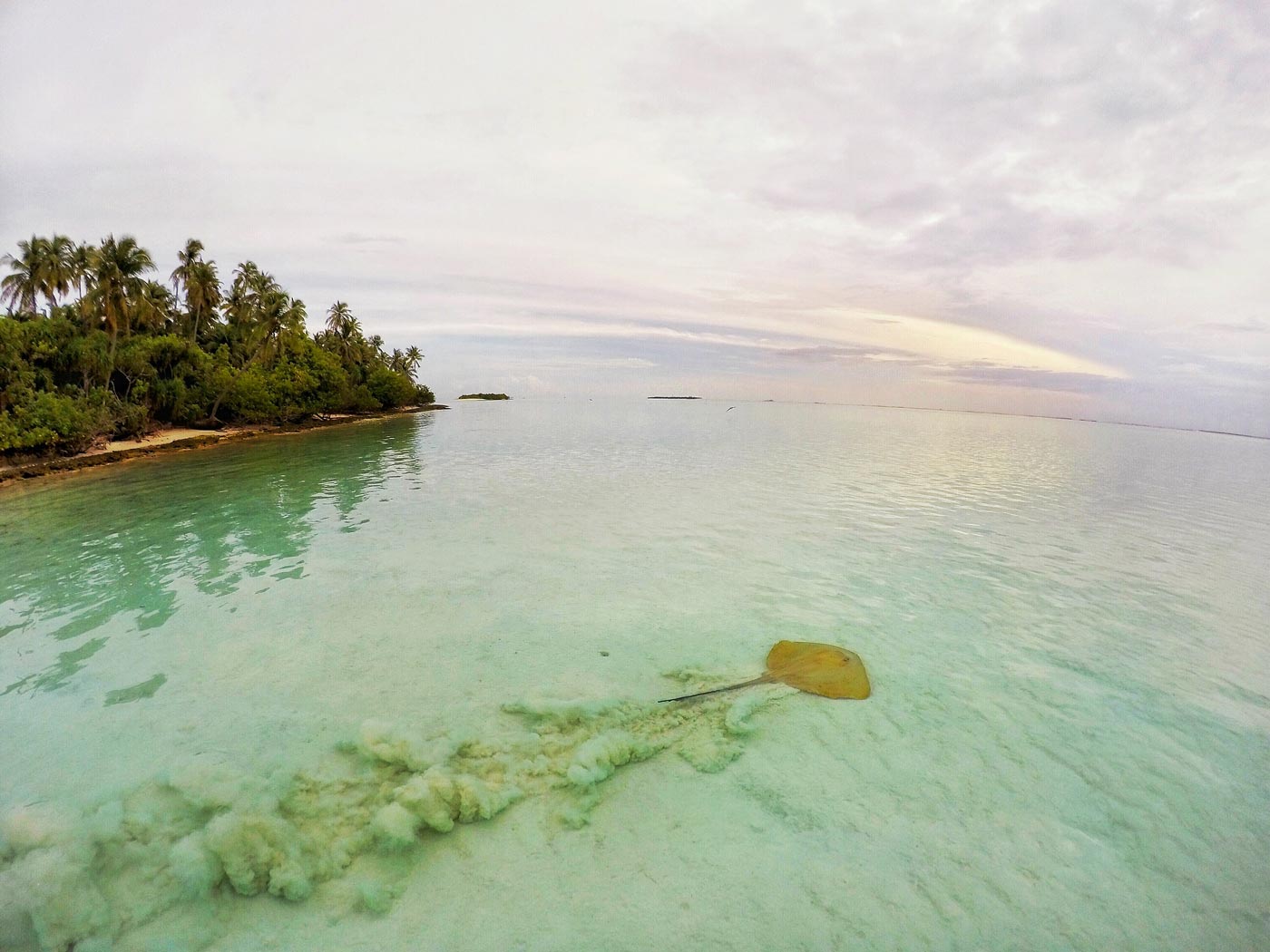
The death of Australian naturalist Steve Irwin from a stingray made international headlines in 2006. Yet it was only the second recorded stingray-induced death in Australian waters since 1945. Stingrays are not naturally aggressive but like any animal will react if frightened. Often hiding in sand to await prey, the ‘stingray shuffle’ (sliding your feet along the sand rather than stepping down hard) can alert the animals to your presence and allow them to take avoiding action.
Stingrays are common in coastal tropical and subtropical marine waters throughout the world. Some species live in the deep ocean, and there are also river stingrays. They have a venomous barb on the end of their tail which they use for defense
Stingray injuries are rarely fatal. In Steve Irwin’s infamous case, the stinger penetrated his chest cavity causing massive trauma. Nonetheless, stings are serious. They can cause pain, bleeding, nausea, weakness, and fainting. Embedded spines are best left to medical professionals to remove. This is in case the barb breaks off in the wound, which may lead to infection.
First aid includes cleaning the wound and immersing the injury in hot (40° C/104° F) water if possible for at least 30 minutes. Remember: Always seek medical attention for a stingray sting.
Weever Fish
This small fish which rests in sandy shallows near the shore punches, literally, above its weight! Its toxic dorsal spines produce acute pain if stepped on. Other symptoms are nausea, headache, and even abdominal cramps. Death is extremely rare.
As with other such injuries don’t remove embedded spines with bare hands. Always wear gloves or use tweezers! To reduce pain, immerse the foot in hot water (as above with stingray injuries). These small but potent fish live in the coastal waters of the Atlantic, North Sea, and the Mediterranean.
Jellyfish
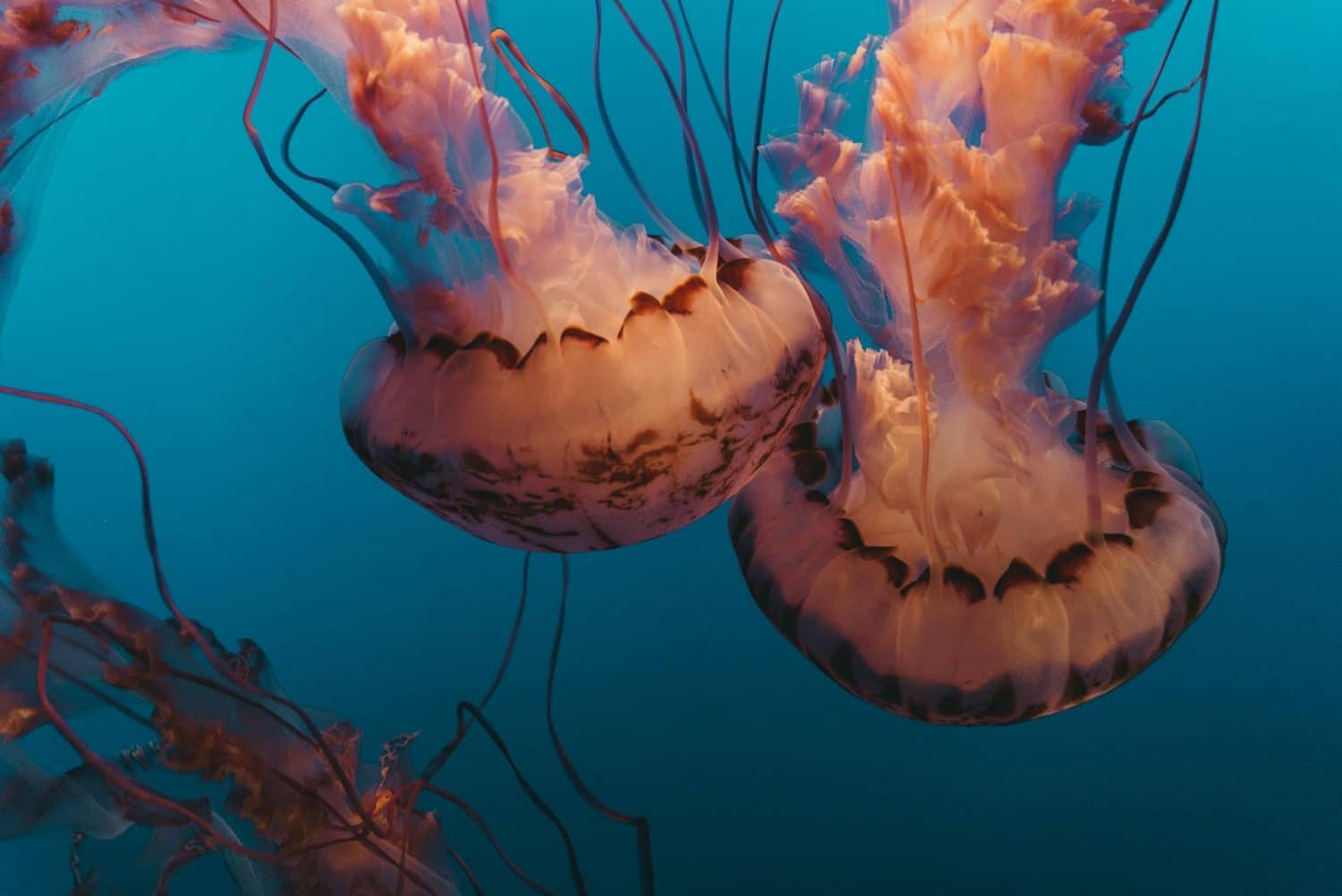
These sea creatures have tentacles covered with individual stingers called nematocysts. Jellyfish generally fire their darts into prey, but swimmers, divers, and snorkelers can be stung by physical contact. Swarms of jellyfish can also wash up on beaches.
in January 2019 about 13,000 stings were recorded on Queensland beaches from a massive influx of bluebottle jellyfish!
In May 2017 more than 300 Barrel jellyfish washed up on a beach in Wales.
So long as the stinger in the animals is still hydrated it can fire off into unsuspecting beachcombers who touch the animals. Always remove any tentacles using gloves or tweezers and, to reduce pain, immerse the affected area in hot water.
Most stings from jellyfish cause rashes and/or blisters. More acute reactions can be headaches or even chest pain. But stings from the Australian Box jellyfish and the Portuguese Man-of-War can be fatal. These need immediate emergency medical attention.
Be prepared to perform CPR in case of respiratory failure. Sea Wasp stings may prove fatal in as little as three minutes. To be safe, do your research before diving: avoid known Box Jellyfish habitats and minimize the amount of uncovered skin.
Blue-Ringed Octopus
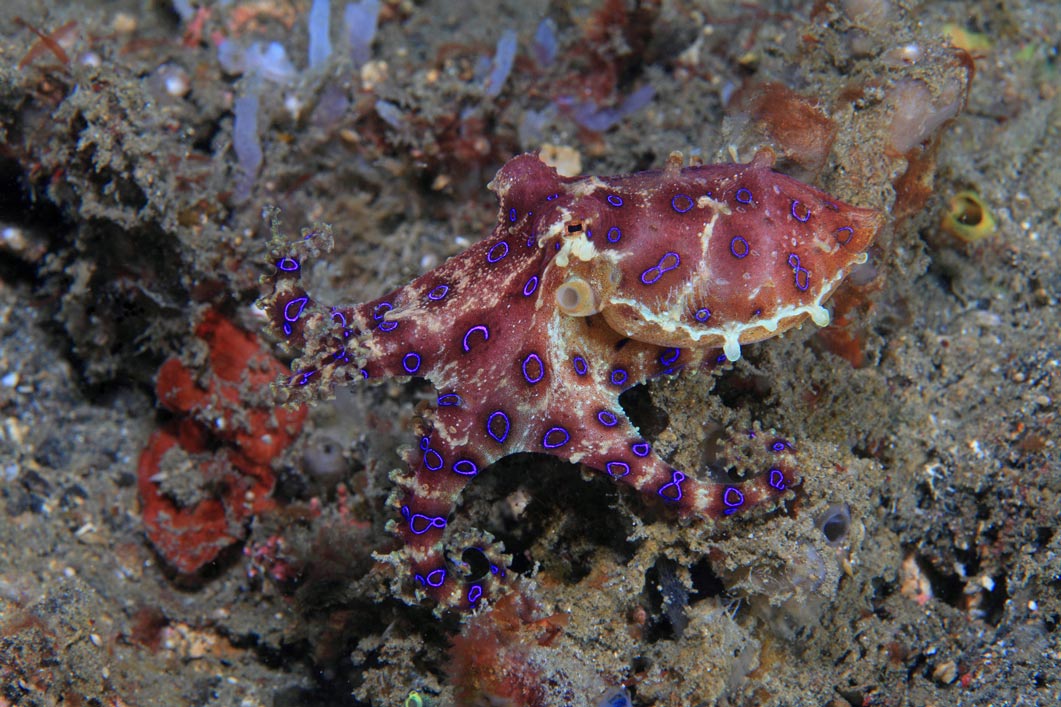
This small (12-20 cm/5-8 in) shy little octopus with its distinctive blue rings has enough venom to paralyze ten adult humans according to a University of Sydney study. Found in tide pools and coral reefs in the Pacific and Indian Oceans, it spends much of its time hiding in small crevices or abandoned shells.
If threatened, its bite is tiny and relatively painless. The venom however can cause tingling of the lips and tongue, followed by difficulty swallowing, dizziness, and headache. This can progress to paralysis and eventual respiratory distress or failure. The victim is aware something is wrong but can do nothing.
If bitten by a Blue-ringed octopus always seek medical attention. First aid is pressure on the wound (‘pressure immobilization technique’) and artificial respiration (CPR) if there are signs of respiratory failure. Hospital treatment consists of putting the victim on a medical ventilator until the patient’s own system can metabolize and secrete the venom. Luckily there are few reported deaths. With timely medical help, full recovery is the norm.
Cone snails
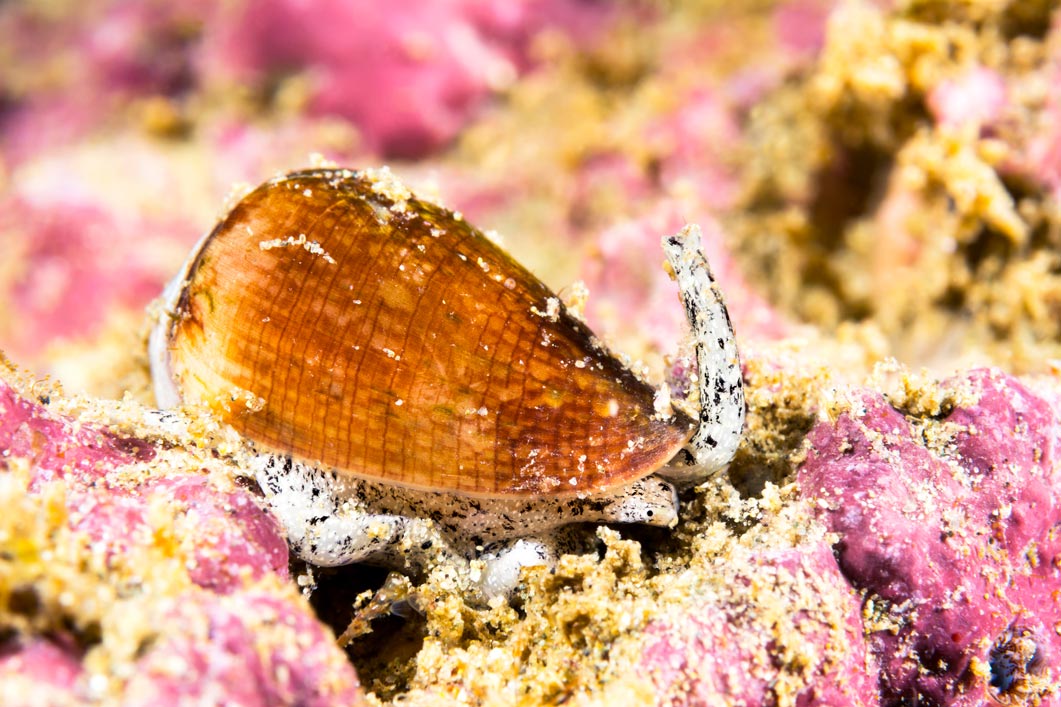
There are about 600 species of cone snail. They can be found in the Indian and Pacific Oceans, the Caribbean and the Red Sea. They live in reefs hiding themselves partially under sandy sediments. They often have beautifully patterned shells, very attractive to collectors.
All cone snails are poisonous to some degree. It is only the larger ones, up to 23 cm/9 in long, which we need to worry about. Every snail has a venom-injecting ‘tooth’; someone picks up a cone snail it responds by ‘biting’ the offender with its harpoon-like tooth.
In the case of the larger snails this tooth can sometimes penetrate gloves or wetsuits. This ‘bite’ can cause mild to moderate pain. In more serious instances numbness, blurred visions and paralysis can occur. Paralysis can sometimes lead to respiratory failure. Symptoms can appear immediately or may take a few days.
Always seek medical attention in case of a cone snail sting. First aid measures can include application of heat (such as soaking the affected area in hot water) for pain relief. Also use of the ‘pressure immobilization technique’ can help slow progression of the toxin. Watch out for symptoms appearing in succeeding days.
Finally
These marine creatures are not generally aggressive but will react if frightened, so some general rules:
- Don’t touch them. Even dead jellyfish can sting!
- Be careful where you put your hands; someone may be lurking under a rock or in a crevice or an abandoned sea shell.
- If walking in shallow water do the ‘stingray shuffle’! This gives anything hidden in the sand time to get out of the way. After all, they don’t want to waste their venom on you!
- The use of vinegar on a sting is controversial but recent research from the University of Hawaii on Man of War stings has shown that rinsing the area with household vinegar can halt discharge of more venom.
- Don’t pee on a sting. It doesn’t help!
- Don’t touch spines with bare hands
- Gently clean the wound but don’t scrub, close, or cover it
- Remember the pressure immobilization technique, and use if recommended (see below)
- Always seek medical advice if there is evidence of chest pain, difficulty in breathing or numbness, or if you are in any way concerned about the injury. Minor injuries might mask a bigger problem. Better safe than sorry!
Pressure Immobilization Technique
This technique was developed in the 1970s by an Australian medical researcher, Struan Sutherland. It was originally designed to be used on certain snake and spider bite injuries. Its purpose is to contain the spread of venom from the affected area, and prevent the venom circulating to reach the vital organs.
It is not suitable for all bites/stings whether for snakes, spiders or other creatures. It is recommended for blue-ringed octopus bites and cone snail stings. Check DAN or another reputable site to refresh your memory if diving in waters where you are likely to meet these creatures.
The procedure is generally to:
- Use an elasticated bandage, if available, to wrap the affected limb and apply firm pressure. Clothing such as a long-sleeved shirt or pantyhose can be used if nothing else is available.
- Begin by bandaging a couple of inches above the bite site and then downwards over and past the bite site to the hand or foot.
- The bandage should be snug but should not impede blood circulation.
- The limb must be kept as immobile as possible as movement will encourage blood flow.
- Splint the limb if possible or use a sling on upper limbs to further immobilize the patient.
- Above all, seek medical help!
These are a few of the problems you may encounter while diving, snorkeling, or other water-based activities. It is important to always keep your First Aid knowledge up to date, and to carry basic First Aid equipment whenever you dive. Remember, the oceans are a marvelous place full of amazing and unique creatures. Respect them, and your visits to their world will be a delight and not a disaster.
![]() To find out more about International Training, visit www.tdisdi.com.
To find out more about International Training, visit www.tdisdi.com.
Marine Life & Conservation
Paul Watson Released as Denmark Blocks Japan’s Extradition Bid

Renowned anti-whaling activist Paul Watson has been released from custody in Greenland after spending five months in detention. Denmark’s Justice Ministry rejected Japan’s request for his extradition, citing insufficient guarantees that his time already served in custody would be credited against any potential sentence.
The 74-year-old Canadian-American was arrested on July 21 in Nuuk, Greenland’s capital, when his ship docked to refuel. His arrest was based on a 2012 Japanese warrant related to a 2010 encounter in Antarctic waters. Japan alleged Watson obstructed operations and caused damage to a whaling research ship during efforts to disrupt illegal whaling. Watson has consistently denied these claims, maintaining his commitment to marine conservation.
Denmark, which oversees extradition matters for Greenland, concluded that while the legal conditions for extradition were met, the lack of assurances from Japan regarding time-served credit made extradition untenable.
In a video shared by his foundation, Watson expressed gratitude and relief, saying, “After five months, it’s good to be out… and good to know they’re not sending me to Japan.” He added that the most difficult part of his time in custody was being separated from his two young sons.
Watson is a pioneering figure in marine conservation, known for founding the Captain Paul Watson Foundation in 2022 after decades of activism with the Sea Shepherd Conservation Society. His bold efforts to defend marine life have earned him widespread support, including from celebrities and conservationists. His work has also been featured in the acclaimed reality TV series Whale Wars.
Watson’s lawyer, Jonas Christoffersen, praised the decision, stating, “We are happy and relieved that Paul Watson is now free.” He added that Watson is eager to reunite with his family and continue his vital work.
The arrest occurred while Watson’s vessel, the M/Y John Paul DeJoria, was en route to the North Pacific with a team of 26 volunteers to intercept a Japanese whaling ship. His foundation described the arrest as politically motivated and emphasized that Watson’s actions were focused on ending illegal whaling practices.
Japan resumed commercial whaling in 2019 after leaving the International Whaling Commission, asserting that whale meat is a cultural tradition. Conservationists, however, continue to challenge these practices, highlighting their impact on marine ecosystems.
Despite the challenges, Watson remains steadfast in his mission to protect marine life and bring attention to whaling practices. His dedication to ocean conservation has made him a globally respected advocate for the environment.
Marine Life & Conservation
12 Days of Zero-Waste Fish-mas

This holiday period, the Marine Conservation Society, the UK’s leading ocean membership charity, invites you to make some simple changes to eating fish this Christmas to help our seas.
Dr Kenneth Bodles, Head of Fisheries and Aquaculture at the Marine Conservation Society, said, “During the festive season, our consumption increases, but so does waste. Sustainability isn’t just about where food comes from – it’s also about how you use it. By reducing waste and making the most out of your seafood, you’re not only taking steps to be more ocean-friendly, but can also help to cut costs during what is often one of the most expensive times of the year”.
The Marine Conservation Society has compiled twelve tips on how to consume seafood sustainably with zero-waste this Christmas:
Buy whole fish instead of fillets
Instead of fillets, consider buying whole fish such as salmon, hake, or lemon sole. By adopting a “nose to tail” approach with cooking, whole-baked fish not only feeds a crowd, but also helps to minimise waste and maximise sustainability by using up every part of the animal, including bones, skin, and fat.
Make fish stock
Leftover fish bones or shells can be put to good use by boiling them to make a nourishing fish stock or bisque. This can be frozen and preserved for later use and makes for a flavourful base in a soup.
Make your own fish pâté
Avoid waste by turning leftover fish, such as smoked mackerel or salmon, into a delicious pâté by blending with cream cheese and lemon. Perfect when paired with crackers.
The sustainability of salmon and mackerel varies depending on where and how it is caught or farmed. For more information on green-rated options, check the charity’s Good Fish Guide.
Buy frozen
By purchasing seafood that is frozen or vacuum-packed, this helps to reduce waste by extending the shelf life of your food.
Fish pie
If you’re wondering what to do with leftover cooked fish, why not opt for a classic fish pie with mashed potatoes, leeks, and a cheesy sauce? A sure crowd pleaser on Boxing Day.
Use the head
Don’t forget the fish head! The meat is incredibly tender and flavourful. The charity recommends a cod’s head curry or recreating Fallow’s renowned cod’s head in siracha butter.
By stretching your ingredients further, not only is this a more sustainable way to enjoy seafood, but also cost-effective by repurposing leftovers and cooking creatively.
Boxing Day brunch
Mix leftover kippers or smoked salmon with scrambled eggs for a tasty, zero-waste, Boxing Day brunch.
For best choice, make sure you buy kippers, or herring, from the North Sea and the North Irish Sea.
Zero-waste storage
A top tip from the Marine Conservation Society to avoid waste is freezing fish offcuts to save for future use.
Crisp up the skin
Even leftover fish skin can be turned into a quick savoury snack by crisping it up in an air fryer with a little olive oil and salt.
Anchovies two ways
Leftover anchovies can either be blended with butter to make a delicious anchovy butter or tossed into pasta for a hit of umami flavour.
The charity recommends opting for anchovies caught in the Bay of Biscay for best choice.
Fishcakes
For an easy, zero-waste meal, leftover seafood trimmings can be mixed with mash and fried in breadcrumbs to make fishcakes.
Pickled mussels
Try pickling mussels in 1:1 vinegar and water, with a dash of sugar for a sustainable, zero-waste snack that can be enjoyed well beyond the festive season.
Mussels farmed in the UK are a seafood superhero. Grown using low-impact methods and harvested by hand, they get all the food they need from the sea around them. This makes them one of the most sustainable, ocean-friendly, and cost-effective seafood options.
Players of People’s Postcode Lottery have raised £6.6M towards the Marine Conservation Society’s vital work in making seafood more sustainable.
Laura Chow, Head of Charities at People’s Postcode Lottery, said: “Fish is a festive favourite for many, but making sustainable choices when it comes to how we buy and eat seafood makes all the difference for our ocean. Support from players of People’s Postcode Lottery has helped the Marine Conservation Society further its sustainable seafood work, so that we can all enjoy healthier, better protected seas.”
The Marine Conservation Society encourages you to make sustainable seafood choices a year-round habit, not just for Christmas. To check how sustainable the seafood on your plate is, you can visit the charity’s Good Fish Guide. The Guide helps consumers and businesses identify the most sustainable seafood using a simple traffic light system, based on where and how species are caught or farmed. Green is the best choice, amber means improvements are needed, and red indicates fish to avoid buying.
Zero-waste gift idea
Why not embrace a zero-waste Christmas by gifting a membership to support marine conservation? It’s a meaningful, low-waste gift that helps protect our ocean for generations to come. Memberships start from as little as £5 a month – the price of a sandwich and drink from your local coffee shop.
Find the latest sustainable seafood advice for wild-caught and farmed seafood on the Good Fish Guide, downloadable to your phone from www.mcsuk.org/goodfishguide.
-

 News2 months ago
News2 months agoIconic SS United States to become the World’s Largest Artificial Reef
-

 News3 months ago
News3 months agoBook Review – 52 Assignments: Underwater Photography
-

 Gear News3 months ago
Gear News3 months agoDYNAMICNORD – New German diving brand enters the British market
-

 News3 months ago
News3 months agoExploring Cenote El Pit: A Diver’s Dream
-

 Gear News3 months ago
Gear News3 months agoTry BARE drysuits (and maybe even win one!) this Friday with Sea & Sea at North West Dive Fest
-

 Marine Life & Conservation3 months ago
Marine Life & Conservation3 months agoBook Review: Coral Triangle Cameos
-

 Blogs2 months ago
Blogs2 months agoDive the Egyptian Red Sea this Autumn with Regaldive
-

 News3 months ago
News3 months ago2024 Ocean Art Underwater Photo Competition Announced















